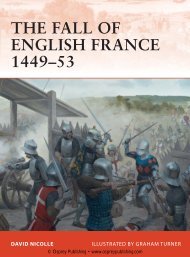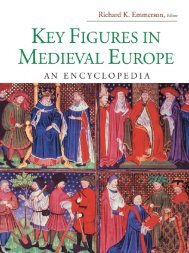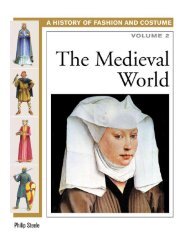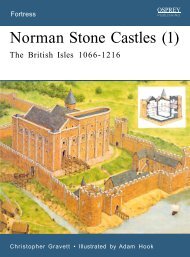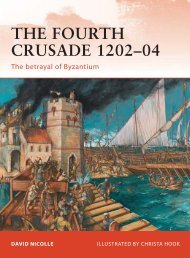Osprey - General Military - Knight - The Warrior and ... - Brego-weard
Osprey - General Military - Knight - The Warrior and ... - Brego-weard
Osprey - General Military - Knight - The Warrior and ... - Brego-weard
Create successful ePaper yourself
Turn your PDF publications into a flip-book with our unique Google optimized e-Paper software.
BEYOND THE BATTLEFIELD: THE KNIGHT IN MEDIEVAL SOCIETY -•<br />
asked <strong>and</strong> voicing their opinions in court, <strong>and</strong> saw little to distinguish the court in the<br />
comfort of Paris or Westminster from the same body of men in the field in Egypt or<br />
northern France.<br />
<strong>The</strong> lord's curia, his court, was part debating chamber <strong>and</strong> part law court, not only<br />
making decisions regarding the running ot the lord's demesne but also hearing <strong>and</strong><br />
deciding upon disputes arising in the lord's l<strong>and</strong>s. <strong>The</strong>se courts ran at all levels from<br />
the individual manor right up to the curui regis, the king's court, <strong>and</strong> all performed<br />
much the same function but on a larger or smaller scale.<br />
In the curia regit the king gathered together many of his direct vassals, the magnates<br />
<strong>and</strong> senior churchmen, to advise him on key decisions concerning the realm, in<br />
particular the raising of taxation <strong>and</strong> finance, <strong>and</strong> also to rule on cases brought before<br />
them, which predominantly concerned disputes over property. Such gatherings were<br />
not always passive <strong>and</strong> increasingly the magnates <strong>and</strong> clergy came to the curia with<br />
their own agenda to set before the king.<br />
In the 14th century these councils started to be known as parlementd, recognizing<br />
this greater element of discussion <strong>and</strong> debate. One of the earliest uses ot the term is in<br />
the Provisions of Oxford, the list of changes imposed upon Henry III of Engl<strong>and</strong> by<br />
Simon de Montfort <strong>and</strong> several magnates of the so-called Reform movement.<br />
It instructed that the king was to meet with his magnate <strong>and</strong> senior churchmen three<br />
times ayear to discuss 'the common needs of the realm'. <strong>The</strong> summons to the parliament<br />
of 1295 issued by Edward I to the Earl of Cornwall sums up the concept quite well.<br />
It reads:<br />
Because we wish to have a consultation <strong>and</strong> meeting with you <strong>and</strong> with the rest of the<br />
principal men of our kingdom, as to provision for remedies against the dangers which<br />
in these days are threatening our whole kingdom; we comm<strong>and</strong> you, strictly enjoining<br />
you in the fidelity <strong>and</strong> love in which you are bound to us, that on the Lord's day next<br />
after the feast of St Martin, in the approaching winter, you be present in person at<br />
Westminster, for considering, ordaining <strong>and</strong> doing along with us <strong>and</strong> with the prelates,<br />
<strong>and</strong> the rest of the principal men <strong>and</strong> other inhabitants of our kingdom, as may be<br />
necessary for meeting dangers of this kind.<br />
This summons, issued to one of the realm's magnates by name, might be fairly typical<br />
but the parliament that the earl was being summoned to was not. For only the second<br />
time the great magnates <strong>and</strong> churchmen who normally attended such meetings were<br />
to be joined by representatives of the commons. Each town <strong>and</strong> city was to select two<br />
of their citizens or burgesses, whilst the counties were to be represented by two knights<br />
elected, who should be able to speak for the freeholders of their county.<br />
185



